A 17-year-old’s ‘revolutionary’ approach to educating new American students in N.H.
The Boston Globe - Amanda Gokee
05/15/2023
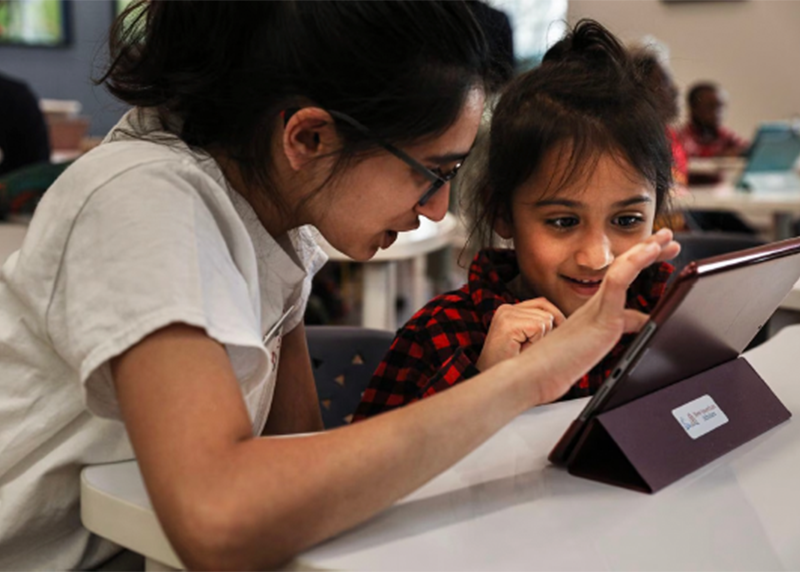
Riyah Patel, a junior at Phillips Exeter Academy, tutors Neda Sadat, 6, at the YWCA in Manchester, N.H. Riyah started New American Scholars, a nonprofit tutoring program to help new American students, when she was 15 years old.CHERYL SENTER FOR THE BOSTON GLOBE
MANCHESTER, N.H. — The upstairs classroom at the YWCA in Manchester was buzzing as new American students from Afghanistan, the Democratic Republic of the Congo, and Rwanda scrambled to pick out books to read.
Others tapped away at iPads to practice reading and writing, as a part of a free after-school tutoring program aimed at filling the gaps that neither the public school system nor their families can.
At the center of it all was Riyah Patel, who at 17 is just a few years older than the students she’s tutoring. Two years ago, she started a nonprofit to provide peer tutoring to refugee students in New Hampshire. Since then, she’s worked with 26 tutors and served 100 students from Concord, Manchester, Nashua, and the Seacoast.
She formed the nonprofit New American Scholars to address what she saw as a persistent problem: New American students are dropped into New Hampshire’s school system and too often left to fail, according to Riyah and Courtney Perron, director of the Center for New Americans at Southern New Hampshire University in partnership with the YWCA.
“We’ve run into issues with their placement,” Riyah said. “Their grade doesn’t reflect accurately where they stand academically. They’ve had years of disruption in education when they were spending it in refugee camps or if they were just simply moving from country to country.”
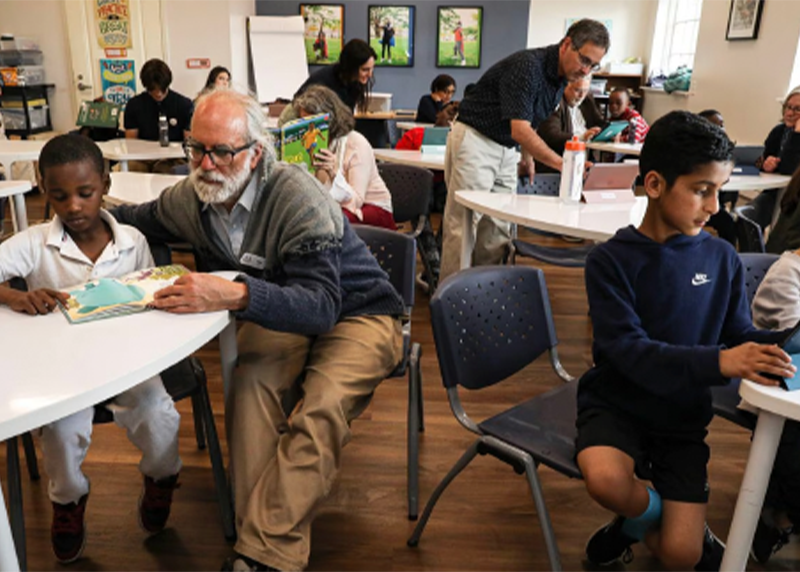
Volunteers for the nonprofit work with children at the YWCA in Manchester, N.H. New American Scholars has worked with 100 students from Concord, Manchester, Nashua, and the Seacoast. The program is free.CHERYL SENTER FOR THE BOSTON GLOBE
Riyah said the students she works with are anywhere from three to five grade levels behind their class. That’s frustrating for students, who often end up tuning out when they can’t keep up, she said.
Andrew Toland, chief of staff for the Manchester superintendent of schools, said the district is working with partner groups to crowdsource solutions for better serving multilingual students. “Our district is saying yes, we’ll take the help we can get,” he said.
A spokesperson for Manchester Mayor Joyce Craig, who is the head of the Manchester Board of School Committee, referred a request for comment to Toland.
One student Riyah works with was placed in ninth grade but performing at a kindergarten level. Riyah, who is now a junior at Phillips Exeter Academy, said it was heartbreaking to see how discouraged and defeated the students felt when she tutored them.
Since Riyah began New American Scholars, she’s been driven by a desire to make New Hampshire more diverse by helping New American students succeed. If she can support young people in school, she believes there’s a greater chance they’ll stay in the state rather than moving away to places with bigger refugee populations.
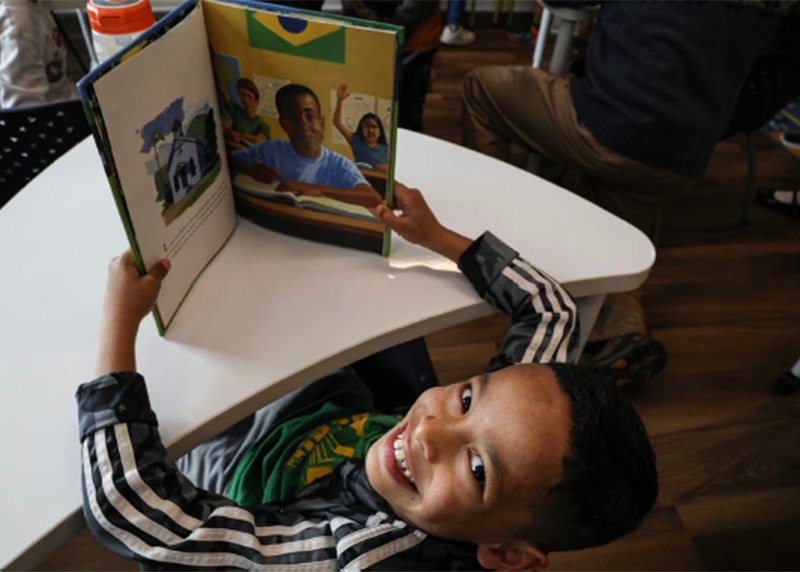
Seven-year-old Firdaws Akbari reads a book during a tutoring class at the YWCA in Manchester, N.H.CHERYL SENTER FOR THE BOSTON GLOBE
“The system is not in place to help these kids,” said Manisha Patel “They’re set up for failure from the beginning, and that’s what’s really sad.”
Riyah’s parents are a big source of support in this endeavor. Both attended a tutoring session in April. Her dad, Jay Patel, doled out iPads, while her 10-year-old sister, Kiki, helped out with tutoring, as did Manisha. But these students can’t typically turn to their own parents for that help. As new arrivals to the country themselves, their parents aren’t in a position to assist with homework — either because they’re working long hours or because they don’t have the language skills or cultural familiarity with the US school system.
For students who can’t pass minimum proficiency tests in reading and writing, college is usually off the table. That limits the kinds of jobs they can get, and sets some on a dangerous path.
“We have kids that are falling through the cracks and because of that achievement gap, they are turning to supports like gangs, and we’re dealing with gang violence and gang affiliation,” said Perron. “Pushing these kids through is not serving anyone.”
She reached out to Riyah in the fall to learn more about her work. When Perron asked Riyah to bring the program to the Center for New Americans, she agreed.
After tutoring refugee students for a year and a half, Riyah realized she needed to perform her own assessments to match students with appropriate learning materials. To do that, she turned to adaptive learning technology, which provides a personalized learning plan to match the student’s pace, style, and preferences.
“It provides us with exercises specific to each one of these kids in a personalized learning pathway that will allow them to independently fill in the gaps so they can catch up with their grade level,” she said. “It’s pretty cool. It’s been a game changer for us.”
She learned how to write grants and won two: from the New Hampshire Women’s Foundation Women and Girls of Color Fund and the New Hampshire Charitable Foundation’s Tomorrow Papoutsy Education and Career fund. That money allowed her to buy 25 iPads, a software subscription to an interactive online learning program called IXL, and other materials like portable Wi-Fi routers and digital pens.
Students complete a 40-minute assessment in math and language arts that helps create a personalized curriculum. Riyah has found that most are two to six years behind.
Tutors then work with the students to complete the curriculum. The questions adapt to the student’s ability, getting more difficult when the student gets a question right and easier if they get it wrong.
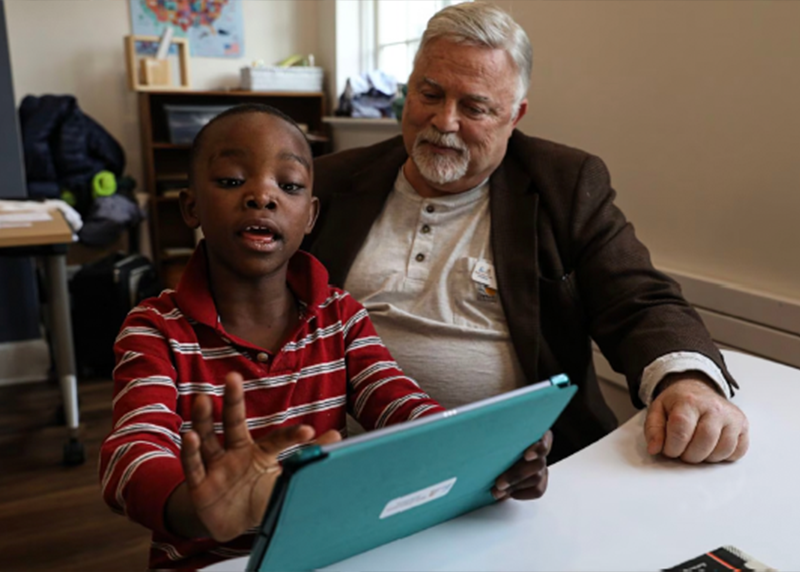
Volunteer Mike Koutelis of Nottingham, N.H., tutors 6-year-old Joel Shariire. Koutelis is one of 26 tutors who have worked with the nonprofit New American Scholars.CHERYL SENTER FOR THE BOSTON GLOBE
Lema Noorzaie is one of the students Riyah works with. She’s from Afghanistan and has seven siblings. Her father was a cook for the American military in Afghanistan, and their family fled the country alongside American military personnel. They were relocated eight times within a year after reaching the US, until being resettled in New Hampshire last year. Each relocation disrupted Lema’s schooling. Now she works with the same tutor on a weekly basis through Riyah’s program.
In addition to the reading and writing program, New American Scholars also organizes small group tutoring sessions at public libraries around the state as well as a study-buddy program that pairs students with tutors who meet one to two times per week on a secure online platform.
Riyah’s work is revolutionary, Perron said, and it’s working for the kids, who are gaining skills such as knowing how to use an iPad in addition to reading, writing, and math. “Riyah demands respect and earns respect from the kids,” she said.
The program is working so well that the Center for New Americans is creating a new peer mentoring summer program for middle schoolers modeled after Riyah’s work.
Riyah has been recognized with four awards in just the past year: Prudential’s Emerging Visionary award, NH Business Review’s “Outstanding Women in Business” award; New Hampshire Women’s Foundation Trailblazer award; and Manchester radio station WZID’s “20 Outstanding Women in New Hampshire” award.
“She’s a visionary,” said Ken Norton, one of the tutors who is volunteering with the reading and writing program. Norton, who is now retired, was the former executive director of National Alliance on Mental Illness New Hampshire and helped advise Riyah on creating her own nonprofit. Now he sees her weighing challenging questions about expanding into other states and how much she can continue to be directly involved.
“I admire her drive to help these kids with their education,” said Aloyo Lidia Yen, who works with the Center for New Americans and has been mentoring Riyah. Yen is a New American herself who is originally from South Sudan, and she’s helped Riyah better understand the immigrant experience. “I would just like to remind her that she can’t fix everything and that’s OK.”
“It’s pretty much all she talks about,” Riyah’s mother said. She and Riyah’s father wish Riyah would spend a bit more time thinking about college. Riyah, who is a junior, is considering taking a gap year, Manisha said, and wants to be sure she has a succession plan in place before she steps away from the organization’s day-to-day operations. The colleges she’s considering are nearby on the East Coast, or maybe she’ll stay in New Hampshire.
Riyah said her work with New American Scholars already has changed her focus for her own education. She’s studying French because it’s the language spoken by many of the students from Africa. She’s shifted away from science as she’s gravitated toward classes like global ethics, war and peace, and American public policy.
She has big plans ahead, and dreams of a time when her organization wouldn’t have to turn away any students.
“I do think we can make a difference,” she said. “We can bridge that gap, and we can work on it starting now.”
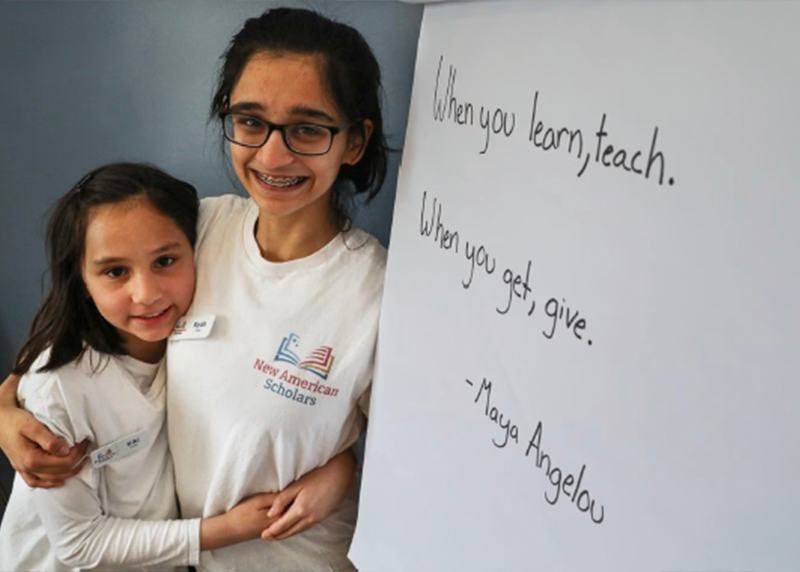
Riyah Patel at the YWCA in Manchester, N.H., with her 10-year-old sister Kiki standing by Riyah's favorite quote by Maya Angelou, "When you learn, teach. When you get, give."CHERYL SENTER FOR THE BOSTON GLOBE
